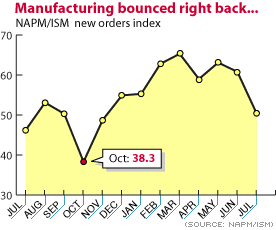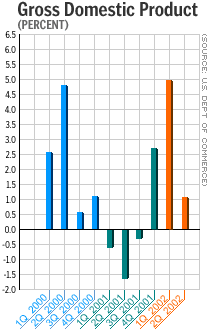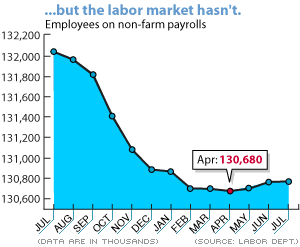NEW YORK (CNN/Money) -
As awful as the Sept. 11 terror attacks were, some economists think they might have helped the U.S. economy.
Though the attacks had obvious negative short-term economic consequences and may continue to weigh on consumer and investor confidence, the policy decisions made in their wake could very well have brought a quicker end to a recession that began early last year.

"It's wrong to say the economy was just smoothly sailing along on Sept. 10," said Joshua Feinman, chief economist at Deutsche Bank Asset Management. "Economic activity started to slow in the second half of 2000 and then started to slip in the spring and summer of 2001."
The highly regarded National Bureau of Economic Research, which identifies the peaks and valleys of the business cycle, using economic indicators such as employment and manufacturing, said a recession began in March 2001, months before the terror attacks.
Gross domestic product, the broadest measure of economic activity, shrank slightly in the third quarter of 2001, which included the attacks, but bounced right back in the fourth. And recent revisions of GDP data actually showed the economy was in worse shape in the first and second quarters of 2001 than after the attacks.
Spurring government spending and rate cuts
One boost to GDP growth after Sept. 11 was a vigorous burst of government spending on defense, security and recovery efforts, which sank the federal budget but gave the economy a short-term shot in the arm.
More important, however, was the dramatic action of the Federal Reserve, which cut its target for short-term interest rates in half between Sept. 17 and Dec. 11. Low rates made possible zero-percent automobile financing and ultra-low mortgage rates, which fueled a refinancing boom.

"The emergency measures actually made the fourth quarter positive when it wouldn't have been," said Lakshman Achuthan, managing director of the Economic Cycle Research Institute. "It definitely mitigated the recession, in terms of duration and, it seems, severity."
Of course, low interest rates are only effective when consumers are willing to take advantage of them, and U.S. consumers certainly were -- indicating they were not nearly as depressed about the attacks as some observers feared.
"When something like this happens, it doesn't mean spending stops," said Kasriel of Northern Trust. "People just spend on different things. Rather than going out as much, they buy a big-screen TV or two."
That give-and-take meant the attacks actually helped some industries -- while the airline, tourism and leisure businesses suffered in the attacks, the defense, security and home-improvement industries healed. And both airline travel and the tourism industry probably would have suffered last year anyway, since their fortunes are tied to the broader economy.
The labor market, which also fell off a cliff after Sept. 11, hasn't bounced back yet. But it's stabilized, and it's a lagging economic indicator anyway -- businesses usually don't start hiring until well after an economic recovery has begun.
"This is a jobless recovery, and that's going to depress consumer spending," said Anthony Chan, chief economist at Banc One Investment Advisors. "But is it depressing enough for a double dip? I don't think so."
The psychological impact of Sept. 11
Of course, it seems impossible for the Sept. 11 attacks to simply have occurred without any long-term negative effects.
Certainly the disappearance of the federal budget surplus, higher security costs for businesses and the continuing woes in the travel and tourism industries can't be good, though economists still aren't sure how much of a problem these issues will be.
And, contrary to those who argue that swift government spending and the series of Fed rate cuts sped up the recovery, other economists believe the attacks delayed a recovery that otherwise might already have begun by September.

"[In early September] we were telling our clients that it looked like a recession in the manufacturing sector was coming to end," said Wachovia Securities economist Jay Bryson. "Then came Sept. 11, and new [manufacturing] orders fell off a cliff."
But the biggest negative effect of the attacks could be the damage they did to consumer and investor psychology.
"[The attacks] really brought the bar down on the end of the exuberant 1990s," said Brown Brothers Harriman economist Lara Rhame. "A lot of the issues we're seeing now with the economy have to do with shaky business confidence and investor uncertainty -- that was all spawned from Sept. 11."
| |
 Related stories
Related stories
| |
| | |
| | |
|
Obviously, investor confidence was also shaken by a rash of corporate accounting scandals, beginning with the meltdown of Enron in December and continuing this year with WorldCom and more.
But some economists think the rash of scandals wouldn't have had nearly the same impact if not for Sept. 11.
"The attacks left investors in a more fragile psychological condition," said Putnam Investments economist David Kelly. "If not for Sept. 11, American investors would have felt a little more confident and shrugged off more of these stories."
On the other hand, it's possible that stocks fell in large part because investors realized that an old-fashioned recession had taken place under their noses, even before the Sept. 11 attacks, forcing them to re-think their ideas about how the "productivity miracle" of the "New Economy" had made recessions a thing of the past.
"If [the recession] wasn't caused by a shock, but was more a part of an endogenous process in the economy, then you need to reassess the risk premium you charge when valuing stock," said said Achuthan of the Economic Cycle Research Institute. "That's the big picture behind [this year's] second-quarter [stock] slide."

|

